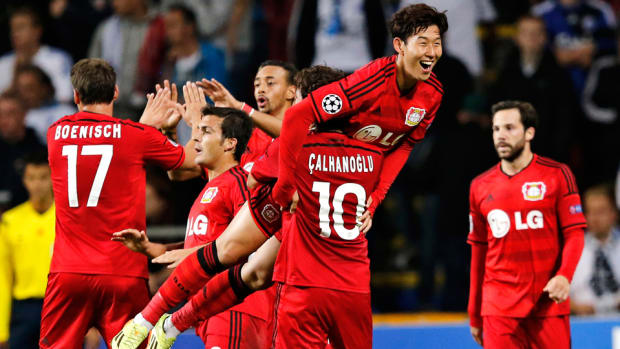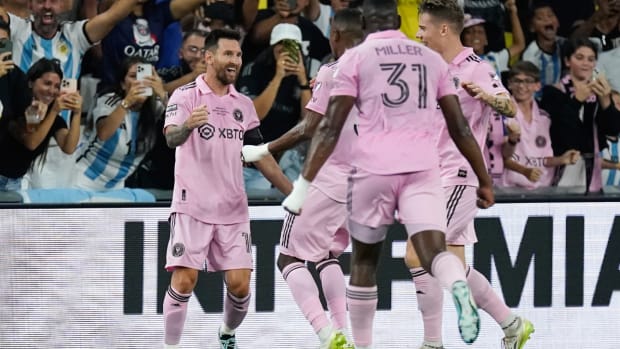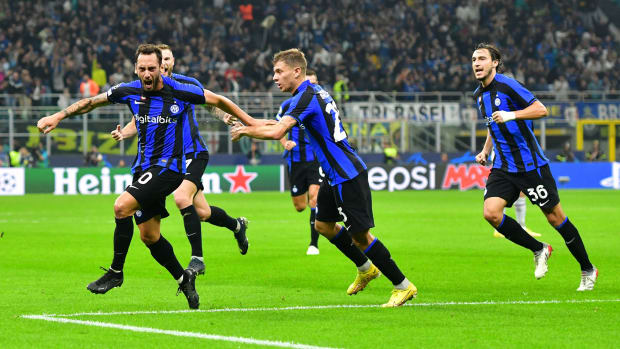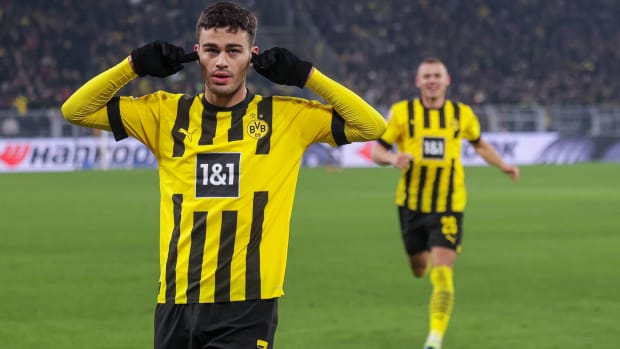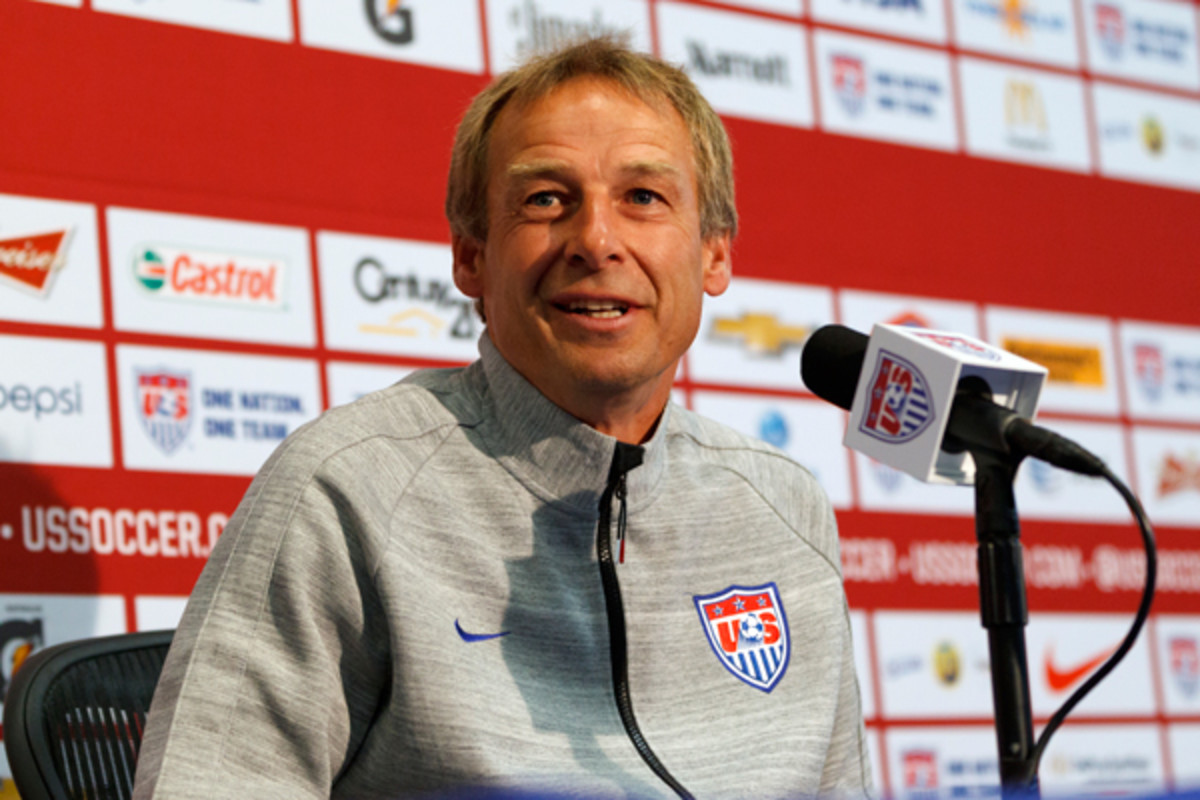
Jurgen Klinsmann faces the tough questions after revealing his World Cup roster
Jurgen Klinsmann faced tough questions a day after naming his final World Cup roster. (Jason O. Watson/Getty Images)
STANFORD, Calif. — Jurgen Klinsmann has faced tougher press conferences before — the guy played for or coached Germany in four World Cups — but this was the hardest one he had ever encountered as the coach of the U.S. national team. Klinsmann has said he views the U.S. soccer media as “kittens” compared to their global brethren, but now, a day after naming his 23-man World Cup roster, he got hit with some hard questions.
What exactly did he mean yesterday when he said the players who made the squad (presumably including Brad Davis, Julian Green and Chris Wondolowski) were “slightly ahead” of the most newsworthy cut, Landon Donovan? How much did Klinsmann’s recent contract extension through 2018 (a rare occurrence before a World Cup) impact his choices of youngsters like Green, DeAndre Yedlin and John Brooks, who will have a much bigger impact in four years?
And what was up with that tweet (now deleted) from Klinsmann’s 17-year-old son, Jonathan, a U.S. under-18 team goalkeeper, that openly mocked Donovan’s exclusion from the World Cup squad?
It’s not often that U.S. soccer press conferences are broadcast live on SportsCenter, one of the clearest signs yet that the World Cup has become a truly big-time event in the United States. Klinsmann answered the questions calmly, though he did look awfully tired after what no doubt has been a whirlwind 24-hour period.
WAHL: Klinsmann takes on added pressure after cutting Landon Donovan
If you go to Klinsmann’s press conferences — and I’ve been attending them for years now — you learn after a while not to hold him to everything he says. JurgenWorld is a fluid concept. And while Klinsmann is as affable as they come, grinning and giggling like a German surfer-dude, there’s an edge behind the smile that’s as hard as forged steel. You get the sense that Klinsmann behind closed doors is often a different person from the one you see in front of the cameras, and that’s not necessarily a bad thing. After all, the World Cup is about winning the most desired trophy in global sports, and he’s done it.
As for his answers to the big questions above, well, Klinsmann didn’t provide a lot of detail. He refused to name the players Donovan was competing with for a spot. (“We feel like the other players, without naming any of those guys, are a tiny bit ahead of him.”) And only when pressed did he vaguely address the technical aspects that led to Donovan’s departure.
“We read everything, and where he may be is maybe not now anymore to go one-against-one all the time or going into the box or finishing off,” Klinsmann said. “[But] he brings other values to the table: his outstanding passing game, his experience, which is a big factor always. Other elements. He changed his game over the last few years, which is normal at that stage of his career. Those things we coaches discuss, strengths and weaknesses of the other guys that we have, and then we have to make a decision.”
STRAUS: Breaking down the non-Donovan U.S. roster surprises
Perhaps Klinsmann was bending over backward to be nice, but it sounded like the reasons he would have used to include Donovan, not exclude him.
Then there’s the other big question: By having his contract extended to 2018, is Klinsmann already thinking ahead to the World Cup four years from now and putting less emphasis on the results of the World Cup that starts in three weeks? It’s a killer group, after all, and that might help explain why he chose so many youngsters, including Green, 18; Yedlin, 20; and Brooks, 21.
Is this World Cup roster really the best possible one for today? And if Klinsmann didn’t have a contract that goes past this World Cup — a luxury that U.S. predecessors Bob Bradley, Bruce Arena and Steve Sampson never had — would he have made any different decisions on this 23-man squad?
“No, this is based on today,” Klinsmann said. “This is based on what hopefully goes well the next seven to eight weeks. So that had nothing to do with my contract or with the perspective that those young players have for the longer run. It’s our strong feeling that these guys are ready for the World Cup, for coming in anytime and doing well.”
“This is how they develop in a very fast pace,” he continued. “We see them growing every day in training, getting stronger and stronger, so we feel very strongly about those players. If you go through it, it’s a very experienced roster, it’s not a young roster. And I think we have a great mixture of guys, and some have a learning curve ahead of them, there’s no doubt about it. If you talk about a Julian Green, a DeAndre Yedlin, a [John] Brooks. But they are ready for that learning curve, and they might surprise some people out there.”
WC CAMP DIGEST: All of Planet Futbol's content chronicling the USA's road to Brazil
Contracts be damned, would Klinsmann still get fired if the U.S. plays poorly in this World Cup? Potentially. But he does have a cushion that previous U.S. coaches haven’t had: If the U.S. performs OK but doesn’t advance from the group, he’ll still be in charge through Russia 2018, as long as the U.S. qualifies. Personally, I don’t think Klinsmann picks this exact same 23 if his contract is up this year.
As for his son’s tweet? “Hugely disappointed,” Klinsmann said. “Obviously as a father you put him in line, and he owes [Donovan] a huge, huge apology. That was highly disrespectful, and I think he got his biggest social media lesson he could imagine.”
There are some who would point to the tweet and say that it shows the Klinsmann family has a personal problem with Donovan. But honestly, I don’t think it’s a big deal. Teenagers do dumb things sometimes, and while this one showed terrible judgment, I’d rather evaluate Klinsmann’s performance based on the decisions he makes with the team.
Plus, by dropping Donovan and choosing this roster, Klinsmann has given everyone plenty of data points to make that evaluation next month in Brazil. It’s entirely possible that Friday’s press conference won’t be the last time Klinsmann faces some hard questions.

